|
 Secure Site
Secure Site
|
 |
Archive for the 'Zen Timers' Category
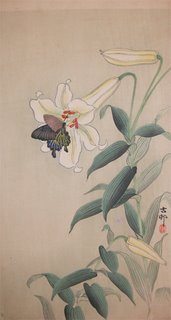 Butterfly on Large Light Yellow Lilly, Kosan 1912
The falling flower
I saw drift back to the branch
was a butterfly.
–Arakida Moritake (1473-1549)
 Bamboo Digital Chime Clock, a meditation timer and alarm clock
Now & Zen
1638 Pearl Street
Boulder, CO 80302
Posted in Bamboo Chime Clocks, Chime Alarm Clocks, Japanese Inspired Zen Clocks, Japanese Poetry, Meditation Timers, Meditation Tools, mindfulness practice, Natural Awakening, Now & Zen Alarm Clocks, Progressive Awakening, Zen Timers
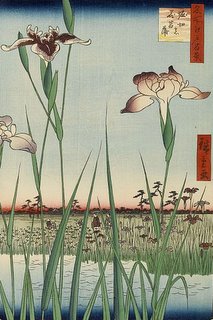 One Hundred Famous Views of Edo. #56. Irises at Horikirin, Hiroshige The term “Japanese iris” encompasses three varieties of irises cultivated in gardens or growing wild in Japan: hanashōbu, kakitsubata and ayame.
adapted from wikipedia.org
 Timer for meditation by Now & Zen Inc.
Now & Zen
1638 Pearl St.
Boulder, CO 80302
Posted in Chime Alarm Clocks, Japanese Inspired Zen Clocks, Meditation Timers, Meditation Tools, Natural Awakening, Now & Zen Alarm Clocks, Yoga Timer, Zen Timepiece by Now & Zen, Zen Timers
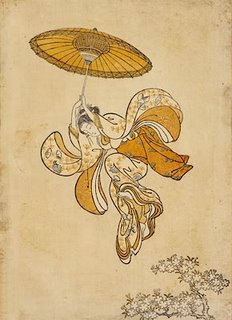 Harunobu Ukiyo-e Print, Girl Parachuting Into the Branches of a Flowering Cherry this world of dew
is yes, a world of dew
and yet…
-issa kobayshi-
 Black Lacquer Zen Alarm Clock and Meditation Timer
Now & Zen
1638 Pearl Street
Boulder, CO 80302
Posted in Japanese Inspired Zen Clocks, Japanese Poetry, Meditation Timers, Meditation Tools, mindfulness practice, Natural Awakening, Now & Zen Alarm Clocks, Well-being, Yoga Timer, Zen Timers
 sunflower “The more complex a being is, so our Scale of Complexity tells us, the more it is centered upon itself and therefore the more aware does it become. In other words, the higher the degree of complexity in a living creature, the higher its consciousness; and vice versa. The two properties vary in parallel and simultaneously. If we depict them in diagrammatic form, they are equivalent and interchangeable.“
–Pierre Teilhard de Chardin, The Future of Man–
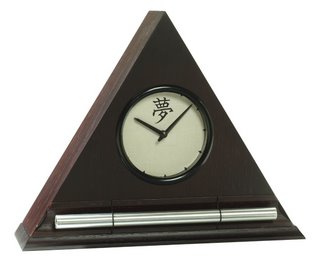 Dream Kanji Zen Alarm Clock with Chime in Dark Oak Finish
Now & Zen
1638 Pearl Street
Bouder, CO 80302
Posted in Chime Alarm Clocks, Well-being, Yoga Timer, Zen Timers
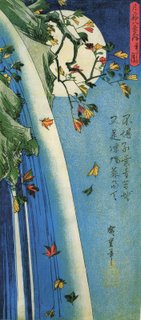 Hiroshige, The Moon Over A Waterfall - woodblock print
The sage has three treasures
simplicity
patience
compassion
-Basho
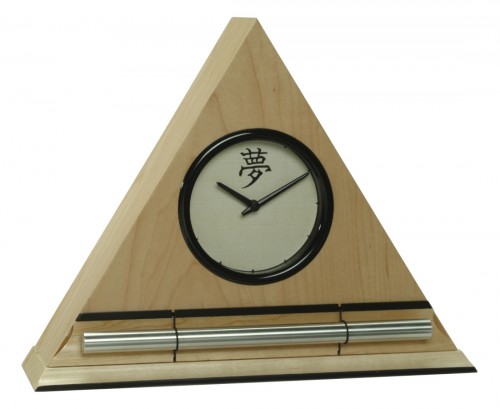 Maple Kanji Zen Alarm Clock, progressive chime alarm clock
Now & Zen
1638 Pearl Street
Boulder, CO 80302
Posted in Bamboo Chime Clocks, Chime Alarm Clocks, Japanese Inspired Zen Clocks, Japanese Poetry, Meditation Timers, Meditation Tools, Natural Awakening, Now & Zen Alarm Clocks, Yoga Timers by Now & Zen, Zen Timers
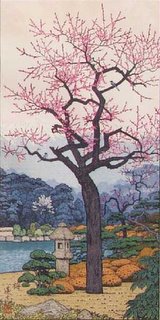 Yoshida, "Plum" woodblock print Moon, plum blossoms,
this, that,
and the day goes.
-Issa-
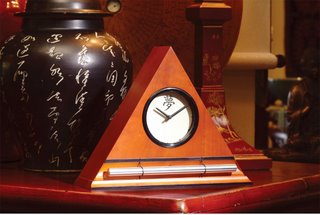 Zen Alarm Clock with Chime and Dream Kanji Dial Face
Now & Zen
1638 Pearl Street
Boulder, CO 80302
Posted in Chime Alarm Clocks, Japanese Inspired Zen Clocks, Meditation Tools, mindfulness practice, Natural Awakening, Now & Zen Alarm Clocks, Progressive Awakening, Well-being, Yoga Timer, Zen Timers
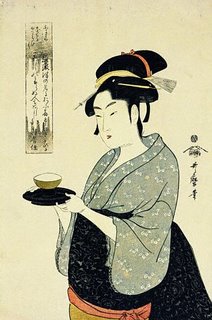 Kitagawa Utamaro Ukiyo-e, wabi-cha Wabi-cha, or wabi-tea, is a style of Japanese Tea Ceremony particularly associated with Sen no Rikyu and Takeno Joo before him. Wabi-cha emphasizes simplicity. The term came into use in the Edo era (1603 to 1868), prior to which it was known as wabi-suki, suki generally referring to the concept of “artistic inclination,” and “wabi” literally meaning ‘forelorn’.
adapted from wikipedia.org
 Zen Chime Clock with Japanese Maple Leaves in Honey Finish Now & Zen
1638 Pearl St.
Boulder, CO 80302
Posted in Bamboo Chime Clocks, Chime Alarm Clocks, Japanese Inspired Zen Clocks, Meditation Timers, Meditation Tools, mindfulness practice, Natural Awakening, Now & Zen Alarm Clocks, Progressive Awakening, Yoga Timer, Yoga Timers by Now & Zen, Zen Timers
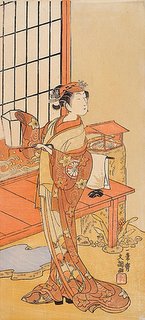 Ukiyo-e by Ippitsusai Buncho of the actor Segawa Kikunojo Iki is a traditional aesthetic ideal in Japan. Iki, having emerged from the worldly Japanese merchant class, may appear in some ways a more contemporary expression of Japanese aesthetics than concepts such as wabi-sabi. The term is commonly used in conversation and writing, but is not necessarily exclusive of other categories of beauty.
Iki is an expression of simplicity, sophistication, spontaneity, and originality. It is ephemeral, romantic, straight forward, measured, audacious, smart, and unselfconscious.
Iki is not overly refined, pretentious, complicated, showy, slick, coquettish, or, generally, cute. At the same time, iki may exhibit any of those traits in a smart, direct, and unabashed manner.
Iki may signify a personal trait, or artificial phenomena exhibiting human will or consciousness.
Iki is not used to describe natural phenomena, but may be expressed in human appreciation of natural beauty, or in the nature of human beings.
Murakami Haruki (b.1949), who writes in a clear, unflinching style–at turns sentimental, fantastic, and surreal–is described as embodying iki. In contrast, Kawabata Yasunari (1899-1972) writes in a more poetic vein, with a closer focus on the interior “complex” of his characters, while situations and surroundings exhibit a kind of wabi-sabi. That said, stylistic differences may tend to distract from a similar emotional subjectivity. Indeed, iki is strongly tied to stylistic tendencies.
adapted from wikipedia.org
 Bamboo Digital Chime Clock, for a progressive awakening
Now & Zen
1638 Pearl Street
Boulder, CO 80302
Posted in Bamboo Chime Clocks, Japanese Inspired Zen Clocks, Meditation Timers, Meditation Tools, mindfulness practice, Natural Awakening, Progressive Awakening, Zen Timers
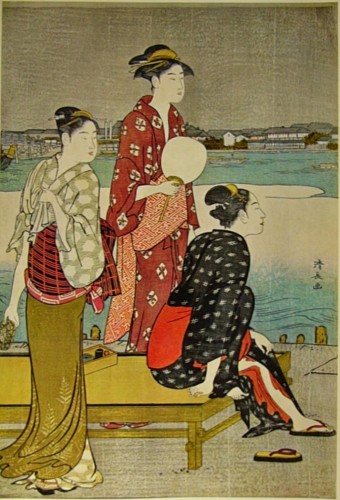 Kiyonaga Riverside Ukiyo-e The phrase iki is generally used in Japanese culture to describe qualities that are aesthetically appealing and when applied to a person, what they do, or have, constitutes a high compliment.
Iki is not found in nature. While similar to wabi-sabi in that it disregards perfection, iki is a broad term that encompasses various characteristics related to refinement with flair.
The tasteful manifestation of sensuality can be iki.
Etymologically, iki has a root that means pure and unadulterated. However, it also carries a connotation of having an appetite for life. Iki is never cute.
The basis of iki is thought to have formed among urbane commoners (chonin) in Edo in the Tokugawa period (1603 to 1868). Iki is sometimes misunderstood as simply “anything Japanese”, but it is actually a specific aesthetic ideal, distinct from more ethereal notions of transcendence or poverty. As such, samuri, for example, would typically, as a class, be considered devoid of iki, (see yabo).
At the same time, individualistic warriors are often depicted in contemporary popular imagination as embodying the iki ideals of a clear, stylish manner and blunt, unwavering directness. The term became widespread in modern intellectual circles through the book The Structure of “Iki” (1930) by Kuki Sukuzo.
adapted from wikipedia.org
 Digital Zen Timers, a mindfulness practice tool Now & Zen
1638 Pearl Street
Boulder, CO 80302
Posted in Bamboo Chime Clocks, Beauty, Meditation Tools, mindfulness practice, Natural Awakening, Now & Zen Alarm Clocks, Progressive Awakening, wabi-sabi, Yoga Timer, Zen Timers
« Previous Page — « Previous Entries
Next Entries » — Next Page »
|
|
|
|